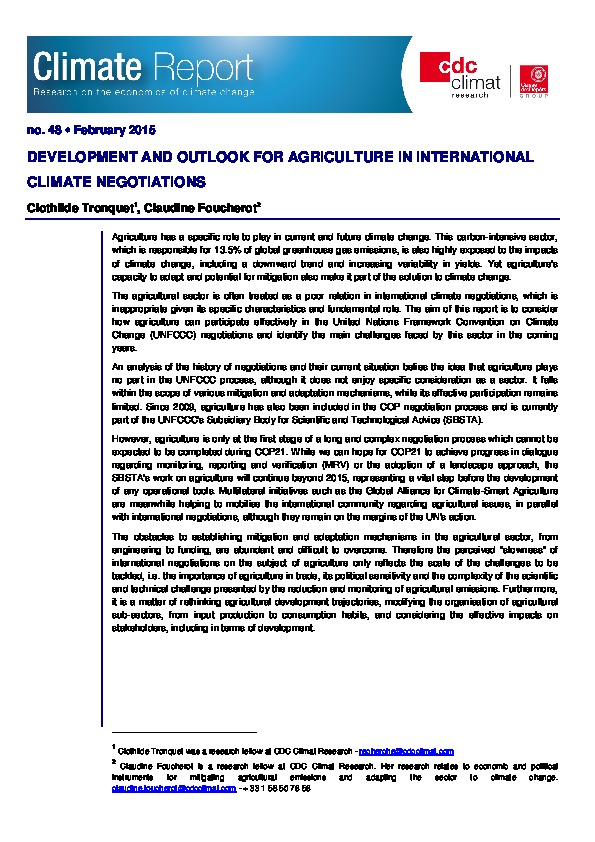DEVELOPMENT AND OUTLOOK FOR AGRICULTURE IN INTERNATIONAL CLIMATE NEGOCIATIONS
By Clothilde TRONQUET, Claudine FOUCHEROT
Agriculture has a specific role to play in current and future climate change. This carbon-intensive sector, which is responsible for 13.5% of global greenhouse gas emissions, is also highly exposed to the impacts of climate change, including a downward trend and increasing variability in yields. Yet agriculture’s capacity to adapt and potential for mitigation also make it part of the solution to climate change. The agricultural sector is often treated as a poor relation in international climate negotiations, which is inappropriate given its specific characteristics and fundamental role. The aim of this report is to consider how agriculture can participate effectively in the United Nations Framework Convention on Climate Change (UNFCCC) negotiations and identify the main challenges faced by this sector in the coming years.
An analysis of the history of negotiations and their current situation belies the idea that agriculture plays no part in the UNFCCC process, although it does not enjoy specific consideration as a sector. It falls within the scope of various mitigation and adaptation mechanisms, while its effective participation remains limited. Since 2009, agriculture has also been included in the COP negotiation process and is currentlyn part of the UNFCCC’s Subsidiary Body for Scientific and Technological Advice (SBSTA). However, agriculture is only at the first stage of a long and complex negotiation process which cannot be expected to be completed during COP21. While we can hope for COP21 to achieve progress in dialogue regarding monitoring, reporting and verification (MRV) or the adoption of a landscape approach, the SBSTA’s work on agriculture will continue beyond 2015, representing a vital step before the development of any operational tools. Multilateral initiatives such as the Global Alliance for Climate-Smart Agriculture are meanwhile helping to mobilise the international community regarding agricultural issues, in parallel with international negotiations, although they remain on the margins of the UN’s action.
The obstacles to establishing mitigation and adaptation mechanisms in the agricultural sector, from engineering to funding, are abundant and difficult to overcome. Therefore the perceived “slowness” of international negotiations on the subject of agriculture only reflects the scale of the challenges to be tackled, i.e. the importance of agriculture in trade, its political sensitivity and the complexity of the scientific and technical challenge presented by the reduction and monitoring of agricultural emissions. Furthermore, it is a matter of rethinking agricultural development trajectories, modifying the organisation of agricultural sub-sectors, from input production to consumption habits, and considering the effective impacts on stakeholders, including in terms of development.

